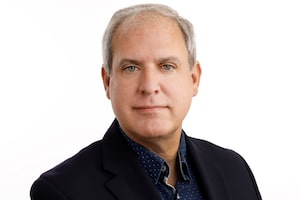
In a 4½-minute video, Conservative MP Alain Rayes announced he was leaving the caucus to sit as an independent. He was former leader Andrew Scheer’s Quebec lieutenant.Adrian Wyld/The Canadian Press
If you think Alain Rayes left Pierre Poilievre’s Conservative Party because the former was a Red Tory diehard, think again. It wasn’t about right and left.
In the 4½-minute video in which Mr. Rayes announced he was leaving the caucus to sit as an independent, he said he was not bitter, but it was obviously a sour departure. The Quebec MP said he was dispirited by how mean-spirited and ugly politics has become. He meant within his own party. He said he had felt it.
There were some things on which he disagreed with Mr. Poilievre, such as climate policy, but Mr. Rayes has sold Conservative environmental policy for seven years. What really bothered him, he said, was what he saw as the nasty tone of politics, and Mr. Poilievre’s populist embrace of it in the leadership race.
In an interview, Mr. Rayes said he believes in law and order, while Mr. Poilievre never distanced himself from the so-called Freedom Convoy when it blockaded bridges and streets. He said he’s concerned about protecting institutions, while Mr. Poilievre campaigned on firing the Governor of the Bank of Canada.
Above all, it was the tone. He said in the video that the way politicians speak, and the way Canadians speak to each other on social media, has become surly, hateful and threatening at times. In the interview, he said he’d felt his party go there in the leadership campaign, and it made him feel like he didn’t belong.
Pierre Poilievre is the new Conservative Party Leader. His policies and career so far
He suggested some of the people around Mr. Poilievre, naming chief strategist Jenni Byrne, fuel that kind of attitude. Ms. Byrne, who was previously prime minister Stephen Harper’s campaign manager, has a reputation for no-holds-barred tactics.
“I saw how some conducted themselves in the leadership campaign, not just the candidates but even the members, the new members who joined the party. You wouldn’t wish on our worst enemy the attacks we saw go by on social media and in e-mails, even after the leader was elected,” he said.
“And I didn’t get the impression that that way of politics is going to change when I see people like Jenni Byrne around the leader.”
Mr. Rayes is little known in English Canada but was one of the strongest players in the Conservative Party’s Quebec caucus. He was former leader Andrew Scheer’s Quebec lieutenant. He had run in the province’s politics in 2003, but against Mr. Charest, for the small, more conservative Action démocratique. It was Mr. Harper who recruited the former mayor of Victoriaville into the Conservative Party. Now he has walked out.
Let’s not exaggerate the impact: Mr. Rayes is one MP, and he is not likely to start of a series of defections or round of dissent. Mr. Poilievre’s overwhelming first-ballot victory has put him in undeniable control of the Conservative Party. The Quebec Conservative caucus had mostly backed Mr. Charest in the leadership race, but most appear to be staying with the new boss. Mr. Poilievre went to the party’s Quebec caucus meeting on Monday as a kind of conciliatory step.
On Tuesday, Mr. Poilievre responded to Mr. Rayes’s departure by saying the Quebec MP had “decided not to fight Justin Trudeau’s inflation,” and noted that Conservatives in Mr. Rayes’s riding had voted for him to be leader. He flexed his mandate.
On Mr. Rayes’s side, you’d have to guess there were some unacknowledged sour grapes from a bad beating in a leadership race. And he’d been sour about the intra-party attacks for a long time.
Back in March, he seethed in an interview with The Globe and Mail, saying Mr. Poilievre’s surrogates were so harshly attacking Mr. Charest as a Liberal, and his supporters as Liberal acolytes, that they were telling stalwart Conservatives that they didn’t belong.
On Tuesday, he seemed to be sick of the whole business. He sounded like a politician who now feels the way politics is being done, including in the party he represented in Parliament for seven years, is bad for the soul.
“I can confirm that,” he said.
For subscribers: Get exclusive political news and analysis by signing up for the Politics Briefing.
 Campbell Clark
Campbell Clark